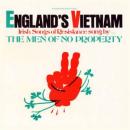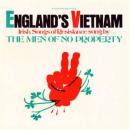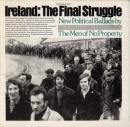On the second day of April, it's well I mind the date,
On the morning of that fateful day in 1878,
When this great Earl of Leitrim - the tyrant I should say,
Left his home in Manorvaughan on the banks of Mulroy Bay.
The landlord gave strict orders, when leaving home that day,
That evictions they should then take place, without undue delay,
His bailiffs they should get to work, as you may understand,
And banish us poor Catholics from out our native land.
The morning it was gentle and the birds did sweetly sing,
And `neath the woods of Cratlagh, they made the valleys ring,
When Leitrim and his party were driving at full trot,
And entering into Cratlagh Wood they got a fearful shock.
The coachman named Buchanan, a lad from Milford town,
He was blown from the dickie, and left sprawling on the ground,
May the Lord have mercy on his soul, poor boy he suffered sore,
Till death did end his sufferings on the banks of Mulroy shore.
John Makim then, the tyrant's clerk, a lad so strong and stout,
He too received some slugs of lead, which made him reel about,
He shouts aloud unto Kincaid as on the ground he lay,
”I'm shot, I'm shot, dear Willie”, on the banks of Mulroy Bay.
The great exterminator; the Lord of this estate,
For him there was an inch of lead - too hard to masticate.
His body it lay lifeless on the road, I heard them say,
To feed the dogs and hungry crows on the banks of Mulroy Bay.
[Here’s to the men who did the deed, may they remain unknown.
But to that band of brothers who claim them as their own,
In Donegal and Leitrim, let Irish men proclaim,
And will you raise your glasses to those that ended Leitrim’s reign!]
On the morning of that fateful day in 1878,
When this great Earl of Leitrim - the tyrant I should say,
Left his home in Manorvaughan on the banks of Mulroy Bay.
The landlord gave strict orders, when leaving home that day,
That evictions they should then take place, without undue delay,
His bailiffs they should get to work, as you may understand,
And banish us poor Catholics from out our native land.
The morning it was gentle and the birds did sweetly sing,
And `neath the woods of Cratlagh, they made the valleys ring,
When Leitrim and his party were driving at full trot,
And entering into Cratlagh Wood they got a fearful shock.
The coachman named Buchanan, a lad from Milford town,
He was blown from the dickie, and left sprawling on the ground,
May the Lord have mercy on his soul, poor boy he suffered sore,
Till death did end his sufferings on the banks of Mulroy shore.
John Makim then, the tyrant's clerk, a lad so strong and stout,
He too received some slugs of lead, which made him reel about,
He shouts aloud unto Kincaid as on the ground he lay,
”I'm shot, I'm shot, dear Willie”, on the banks of Mulroy Bay.
The great exterminator; the Lord of this estate,
For him there was an inch of lead - too hard to masticate.
His body it lay lifeless on the road, I heard them say,
To feed the dogs and hungry crows on the banks of Mulroy Bay.
[Here’s to the men who did the deed, may they remain unknown.
But to that band of brothers who claim them as their own,
In Donegal and Leitrim, let Irish men proclaim,
And will you raise your glasses to those that ended Leitrim’s reign!]
inviata da Alessandro - 24/2/2010 - 16:47
×
![]()





Il testo di questa canzone è stato pubblicato nel 1962 in “The Fanad Patriots”, a cura di Patrick Doherty, e sostanzialmente coincide (ed anzi, è più esatto) con quello che compare nel libretto che accompagna il disco dei The Men of No Property “Ireland: The Final Struggle”, dove il brano è eseguito da Wylde su arrangiamento di Barney McIlvogue.
Uno dei landlords più odiati dell’epoca era senza dubbio William Sydney Clements, signore di Leitrim, che in quella contea e poi nel Donegal e pure nel Galway possedeva centinaia di migliaia di acri di terra. Questo “3rd Earl of Leitrim”, nato a Dublino, aveva fatto una discreta carriera nell’esercito di sua maestà e, una volta in congedo, aveva preso a curare direttamente i propri vasti possedimenti, pretendendo affitti altissimi dai propri mezzadri e, se costoro non riuscivano a farvi fronte, non esitando mai a cacciarli con la forza, cattolici o protestanti che fossero. Il signore di Leitrim era un gran figlio di troia ed era odiato dalla totalità di coloro che erano soggetti alla sua autorità. Così un bel giorno, il 1 aprile del 1878, alcuni uomini di Fanad, nel Donegal, sapendo che il vecchio bastardo si sarebbe recato in una sua tenuta lì vicino, a Mulroy Bay, gli tesero un’imboscata e – se Dio vuole – lo afferrarono per la barba e lo ammazzarono con un colpo di pistola in faccia.
Sebbene nella canzone si dica che gli assassini rimasero sconosciuti, i loro nomi si conoscono e voglio qui ricordarli in evidenza:
Nial Shiels, di Donaghmore;
Michael McElwee (conosciuto come Mickey Rua), di Ballywhoriskey;
Michael Heraghty, di Tullyconnell.
Solo quest’ultimo fu arrestato e morì in carcere, ufficialmente di tifo, in attesa del processo.
L’ultima strofa – tra parentesi quadre - è probabilmente stata aggiunta in epoca successiva, ma l’ho riportata perché compare nella versione dei The Men of No Property… A proposito, il nome di questo gruppo è mutuato da una frase di Wolfe Tone, uno dei padri dell’indipendenza irlandese: “We will free ourselves by the aid of that large and respectable class of the community… the men of no property”, ossia “Riusciremo a conquistare la libertà solo grazie all’aiuto di quella vasta e rispettabile parte della comunità… gli uomini che non posseggono nulla.”